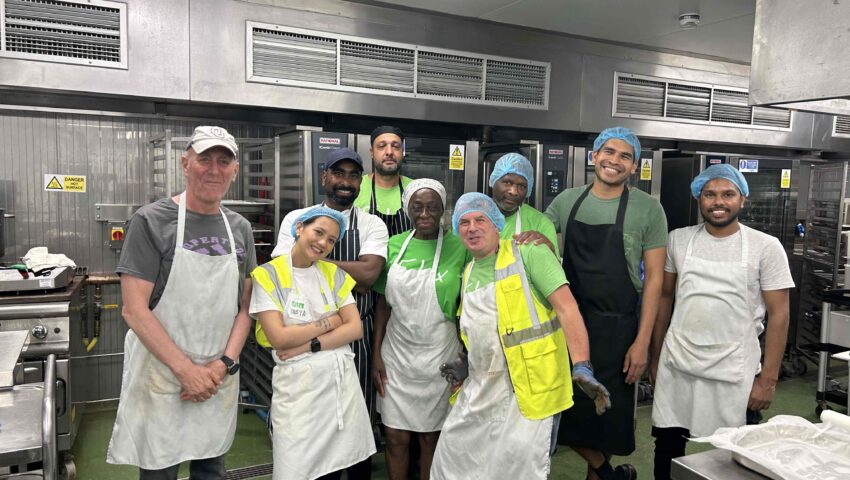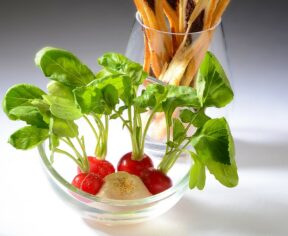Blogs
Supporting the Felix Project

The weekly shop. Love it or hate it, it’s a part of our routine. I go to the supermarket with good intentions. I tell myself “I’m only going to get the essentials”. One by one, I tick each item off my list. I queue for the checkout, my arm straining with the weight of the basket. Of course, it isn’t only milk, bread, and toilet roll. It’s also 2-for-1 tofu, reduced bean sprouts, half-price tomatoes, and a bag of ground almonds (why?). I make an unbreakable promise to myself. I will cook this week, and none of my food will go to waste.
Six days later, the contents of my fridge have grown so much fur, I’ve got new pets. I say a ceremonious goodbye to my moulding vegetables and dump them in the bin. Despite my best efforts to use food scraps, some food waste is inevitable.
We’ve all bought food, only to throw it away at the end of the week. Dinner with friends, work drinks, and takeaways throw tiny spanners in the works. It’s nice to be spontaneous, and food is biodegradable.
So, why are we fussing over food waste?
It boils down to greenhouse gases (GHG). We can reduce 45% of global GHG emissions if we change the way we make and consume products and food (WRAP). Production, transportation, and food’s natural breakdown release 8-10% of the world’s GHGs (WRAP). UK households throw away 6.6 million tonnes of food per year. This is 70% of the UK’s food waste of which 4.5 million tonnes is edible. On top of this, the food industry creates 3 million tonnes of surplus edible food each year.
We discard a third of all edible fruits before they reach the supermarkets. The Guardian reports that if our veggies are the wrong size or shape, they don’t make it to the shelves. This seems bananas at a time when living costs are soaring and food poverty is on the rise. As we throw away wonky courgettes, 4.7 million adults in the UK struggle to put food on the table (The Felix Project).
Is The Felix Project a solution?
There is no quick fix. Food waste is a complex issue, which relies on us to change the way we consume and produce food. But there are effective initiatives, which reduce food waste. The Felix Project rescues surplus good food and redistributes it to those who need it. They receive food donations from over 539 restaurants, delis, and supermarkets. It is then redistributed across 1000 front-line charities, primary schools, and holiday programs. Felix feeds millions of people who are vulnerable, homeless, or with mental health issues. Their dedicated staff and volunteers sort, pack and deliver this food. Within their kitchen they cook hundreds of hot, healthy meals every day. It’s an impressive operation which tackles both food waste and food access.
Volunteering with The Felix Project
I heard this great phrase the other day “To judge, you have to experience”, so I jumped at the chance to volunteer at Felix. With my steel-capped boots and high vis, my shift began with a tour of the Poplar Depot. The sheer size and scale of what they are achieving is remarkable. Volunteers stack boxes upon boxes of bananas in the industrial fridge. Forklifts drop off donations and every hour, more and more surplus food arrives. After packing over 400kg of food for redistribution, I was sweating. Every smoothie, strawberry or yoghurt pot was edible. The amount of good food destined for the bin was unimaginable. In July 2023, The Felix Project redistributed over 3 million meals, supporting thousands of people who, no longer struggle to put food on the table every day.
How we support
The pinnacles of BM’s ethos are community, social impact, and sustainability. BM wants to live in a vibrant and healthy community. Supporting initiatives like The Felix Project puts us one step closer to this goal. Volunteering provides Felix with direct support, there are other ways to get involved. Working with our clients, we launched our campaign ‘Donate A Meal’. For £1.75, customers had the opportunity to pass on a meal to The Felix Project. Donate A Meal runs for 1 week, 3 times a year and so far, we have raised 831 donation meals. That’s £1,454.25. The cooking is down to Felix, but our donation helps to buy the ingredients and equipment they need.
The support for Donate A Meal has been incredible, and the benefits have rippled. Our onsite customer relationships have gone from strength to strength. Our team feels rewarded and engaged, and we have uplifted our community. We haven’t changed the world but have made it a little brighter.
For more information, read Felix’s story here Our Story (thefelixproject.org).




